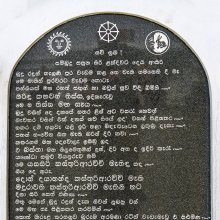Vani, Vāṇī, Vaṇi, Vanī, Vāṇi, Vaṉi, Vāṉi: 29 definitions
Introduction:
Vani means something in Hinduism, Sanskrit, Buddhism, Pali, the history of ancient India, Marathi, Jainism, Prakrit, Hindi, biology, Tamil. If you want to know the exact meaning, history, etymology or English translation of this term then check out the descriptions on this page. Add your comment or reference to a book if you want to contribute to this summary article.
Vani has 28 English definitions available.
Images (photo gallery)
(+4 more images available)
Languages of India and abroad
Sanskrit dictionary
[Deutsch Wörterbuch]
Source: Cologne Digital Sanskrit Dictionaries: Böhtlingk and Roth Grosses Petersburger WörterbuchVani (वनि):—(von 1. van) [Uṇādisūtra 4, 139.]
1) f. das Heischen, Verlangen, Wunsch [Atharvavedasaṃhitā 5, 7, 2. 3.] mā va.iṃ mā vācaṃ no.vīrtsīḥ 6. ya enāṃ va.imā.anti welche um sie bittend kommen [12, 4, 11.] —
2) nom. ag. am Ende eines comp. [Pāṇini’s acht Bücher 3, 2, 27.] —
3) m. Feuer [UJJVAL.] — Vgl. āditya, upamāti, ṛju, kṣatra, dhānya, dhārā, brahma, rāyaspoṣa, vasu, vṛṣṭi, viśva, śata, suprajā .
--- OR ---
Vāṇi (वाणि):—f.
1) das Weben [Amarakoṣa 2, 10, 29.] [Hemacandra’s Abhidhānacintāmaṇi 913.] [Anekārthasaṃgraha 2, 153.fg.] man könnte vāni (von 5. vā) vermuthen; vgl. 1. vāṇī . —
2) = 3. vāṇī Stimme, Rede [Hemacandra’s Anekārthasaṃgraha] [Loiseleur Deslongchamps] zu [Amarakoṣa 1, 1, 5, 1.] —
3) Wolke [Hemacandra’s Anekārthasaṃgraha] —
4) Preis, Werth (mūlya) [Hemacandra’s Anekārthasaṃgraha]; vgl. vasni . — Vgl. antarvāṇi, para, prati .
--- OR ---
Vāṇī (वाणी):—1. f. das Weben [Trikāṇḍaśeṣa 3, 3, 134.] [Medinīkoṣa ṇ. 22.fg.] — Vgl. vāṇi .
--- OR ---
Vāṇī (वाणी):—2. f. = vāṇa Rohr: dṛ.ā ci.sa pra bhedati dyu.nā vāṇīriva tri.aḥ [Ṛgveda 5, 86, 1.] Stäbe am Wagen [1, 119, 5.]
--- OR ---
Vāṇī (वाणी):—
Sanskrit, also spelled संस्कृतम् (saṃskṛtam), is an ancient language of India commonly seen as the grandmother of the Indo-European language family (even English!). Closely allied with Prakrit and Pali, Sanskrit is more exhaustive in both grammar and terms and has the most extensive collection of literature in the world, greatly surpassing its sister-languages Greek and Latin.
See also (Relevant definitions)
Starts with (+170): Vani-an, Vani-an-chi-khat, Vania, Vania, Vania, Vania, Vania, Vaniaya, Vanibhushana, Vanicai, Vanicam, Vanican, Vanicci, Vaniccimeni, Vanici, Vanidenica, Vaniga, Vanigbandhu, Vanigbhava, Vaniggrama.
Ends with (+758): Abhavani, Abhishavani, Abhyavani, Accuruvani, Acuvani, Adakavani, Adavani, Adhavani, Adhikaravani, Adhvani, Adibhavani, Adityavani, Adivani, Agasavani, Agavani, Aggavani, Agghavani, Agnihotrahavani, Agvani, Ahavvani.
Full-text (+242): Antarvani, Akashavani, Varavani, Prativani, Kelivani, Paravani, Daivavani, Meharabani, Vanibhushana, Dharavani, Vanikelvan, Vanimalar, Galavata-Vanda-Vana-Vani, Vrindavani, Pravani, Vaniyati, Vanin, Lanta vaani, Vaṇeti, Kata vaani.
Relevant text
Search found 55 books and stories containing Vani, Vaani, Vāṇī, Vaṇi, Vaṇī, Vanī, Vāṇi, Vānī, Vaṉi, Vāṉi; (plurals include: Vanis, Vaanis, Vāṇīs, Vaṇis, Vaṇīs, Vanīs, Vāṇis, Vānīs, Vaṉis, Vāṉis). You can also click to the full overview containing English textual excerpts. Below are direct links for the most relevant articles:
Garga Samhita (English) (by Danavir Goswami)
Verse 1.13.4 < [Chapter 13 - The Liberation of Pūtanā]
Verse 2.18.28 < [Chapter 18 - The Sight of Śrī Kṛṣṇacandra]
Verse 5.21.37 < [Chapter 21 - The Story of Śrī Nārada]
Rig Veda (translation and commentary) (by H. H. Wilson)
The Gautami Mahatmya (by G. P. Bhatt)
Chaitanya Bhagavata (by Bhumipati Dāsa)
Verse 1.17.138 < [Chapter 17 - The Lord’s Travel to Gayā]
Verse 3.3.369 < [Chapter 3 - Mahāprabhu’s Deliverance of Sarvabhauma, Exhibition of His Six-armed Form, and Journey to Bengal]
Verse 1.4.73 < [Chapter 4 - Name-giving Ceremony, Childhood Pastimes, and Thieves Kidnap the Lord]
Lord Jhulelal: An Analytical Study (by Thakkar Harish Gopalji)
Part 5.5 - Janam Sakhi Shri Amar Uderolal Saheb < [Chapter 2 - Literature Review]
Part 5.8 - Poojya Jhulelal Janam Saakhi E Biyo Bhado Amar Vani < [Chapter 2 - Literature Review]
Part 5.2 - Literature Reviews (Introduction) < [Chapter 2 - Literature Review]
Sahitya-kaumudi by Baladeva Vidyabhushana (by Gaurapada Dāsa)
Text 11.39 < [Chapter 11 - Additional Ornaments]
Text 9.38 [sword diagram] < [Chapter 9 - Ornaments of Sound]
Text 7.69 < [Chapter 7 - Literary Faults]





